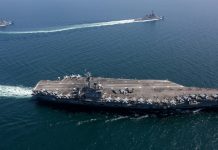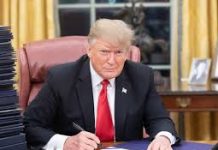
The heightened state of readiness of U.S. military forces within the Persian Gulf is drawing considerable attention. This is in response to Tehran’s strategic endeavors to assert control over commercial vessels navigating the Strait of Hormuz. In a robust display of commitment, the United States has mobilized a deployment of naval vessels and combat aircraft. Notably, discussions are underway regarding the potential deployment of armed forces personnel aboard non-military ships to safeguard maritime interests.
Curiously, amid these developments, a notable observation emerges. Specifically, two senior officers responsible for supervising the evolving scenario are notably absent from their expected positions.
“Let me be clear,” said US Defense Secretary Lloyd Austin, “in our dangerous world, the security of the United States demands orderly and prompt transitions of our confirmed military leaders.”
The current situation revolves around the obstruction of promotions orchestrated by Alabama Senator Tommy Tuberville. This maneuver, aimed at protesting the Pentagon’s policy of covering travel expenses for service members seeking abortions, has caused significant disruption. Specifically, it has impeded the smooth transition of duties for two members of the Joint Chiefs of Staff, with the potential for further complications. This promotions deadlock has broader implications, notably impacting the military’s command structure in the Middle East, precisely as tensions in that volatile region are escalating.
The delay, resulting from Tuberville’s initiative, is anticipated to extend at least until September, if not longer, as both sides involved remain steadfast in their positions. In the context of the Middle East, the impasse is preventing Lt. Gen. Gregory Guillot, the second-in-command at U.S. Central Command, from assuming the leadership of U.S. Northern Command, a crucial role responsible for safeguarding the U.S. homeland.
The proposed replacement for Guillot is Vice Adm. Brad Cooper, who commands all naval forces within Central Command, known as the 5th Fleet. However, Cooper finds himself unable to move due to the circumstances, which in turn prevents his designated successor, Rear Adm. George Wikoff, from assuming the top naval post in the Gulf. This ripple effect even affects Cooper’s deputy, Capt. Joshua Lasky, who is unable to secure a promotion to rear admiral, despite being the second-ranking officer for the entire 5th Fleet.
Officials from the U.S. government assert that despite the bottleneck, operations at both Central Command and the 5th Fleet remain unaffected. This is attributed to the continued presence of experienced leaders such as Guillot and Cooper. Nevertheless, Cooper is navigating a challenging predicament. The optics of leaving the command without an admiral in charge prevent him from departing the region.
“It’s awkward. It’s not helpful. It’s inappropriate, and ultimately, it does detract over the longterm from our combat readiness,” said retired Vice Adm. John Miller, former commander of 5th Fleet.
“A lot of people that are on active duty won’t say that because it’s difficult for them to say. But that’s just wrong.”
When approached for comment, a representative from the 5th Fleet chose not to elaborate on the ramifications of Tuberville’s actions on the command’s operations.
In response to the situation, Secretary of Defense Austin, alongside other senior Pentagon figures, has consistently criticized the obstruction. The concern was accentuated, especially considering the recent retirements of the heads of the Marine Corps and the Army, leaving these positions without confirmed successors during the summer. Just recently, Austin circulated a memorandum outlining certain strategies to mitigate the adverse effects of the hold. Among these strategies is the authorization for officers to temporarily fulfill their roles in an acting capacity.
“This unprecedented, across-the-board hold is having a cascading effect, increasingly hindering the normal operations of this Department and undermining both our military readiness and our national security,” wrote Austin in the memo.
In the Middle East, a noteworthy development is taking shape as the 5th Fleet prepares, for the first time, to deploy teams of armed sailors and Marines onto commercial ships navigating the Strait. A U.S. official, who, along with other sources interviewed for this account, requested anonymity due to the sensitivity of operational plans, shared this information. The Associated Press was the first to report on the U.S. contemplating this strategic maneuver.
Starting from May, the Pentagon has undertaken a series of robust actions, deploying additional warships and advanced fighter aircraft, including the stealthy F-35, to the region. The objective of these assertive moves is to safeguard shipping in response to heightened attempts by Tehran to seize commercial vessels. Of particular significance was the July 5th incident, where Iranian forces attempted to seize two oil tankers near Oman, culminating in the striking of one vessel, the Richmond Voyager, after which the Iranian vessels retreated upon the arrival of the USS McFaul destroyer.
However, this event is just one instance in a series of incidents since spring that have raised growing concerns among U.S. officials about the threat posed to the Strait. This waterway, responsible for facilitating more than a fifth of global crude oil transit, has witnessed a series of security-related events. Notably, on June 4th, three Iranian fast-attack boats engaged in aggressive behavior towards a merchant vessel, necessitating a response from U.S. and British warships. In May, the Iranian Revolutionary Guard Corps apprehended the oil tanker Niovi, en route from Dubai to the port of Fujairah in the United Arab Emirates. In April, a similar incident unfolded as Iran seized the oil tanker Advantage Sweet.
Regarding the recent move to station armed U.S. troops on commercial ships, Pentagon spokesperson Brig. Gen. Patrick Ryder refrained from offering commentary. However, he indicated that the Pentagon has bolstered its presence and intensified patrols in the region. These measures are aimed at enabling swifter responses to potential provocations and deterring any manifestations of Iranian aggression.
“We’re doing this as part of a coalition in the region, to ensure that the Strait of Hormuz remains open, that there’s freedom of navigation, and that we’re deterring any type of maligned activity,” said Ryder.
The strategic determination to station armed American forces aboard potentially threatened commercial ships in the Strait has been established as a “policy decision.” While there has been interest expressed by various companies in the region, the deployment of these teams is contingent upon receiving invitations, as elucidated by the U.S. official. Recent secure video exchanges between Vice Adm. Brad Cooper and shipping representatives have been instrumental in conveying this option.
However, it is crucial to emphasize that the decision to embark such teams will be approached judiciously. The official underscores the necessity of confirming that the vessel faces a “high risk” situation. To qualify, vessels must meet specific criteria, encompassing factors such as their flagging country, crew composition, origin, destination, and cargo nature.
Around a week ago, approximately 100 sailors and Marines from the 26th Expeditionary Unit arrived in Bahrain to undergo training for this mission, as reported by the official. Additionally, forces from the Bataan Amphibious Ready Group, which is presently deployed in the region, may also contribute, potentially forming a total of no less than 20 teams.
The primary objective underlying this initiative is preemptive deterrence. By positioning armed personnel aboard these ships, the intention is to discourage any attempt at seizure before it materializes, affirms the official.
“Iran does not want that confrontation with American steel. They cannot win,” said the official while adding that the U.S. forces will have “enough firepower to fend off an attempted seizure, and will further be protected by the American aircraft and ships in the region. We’re not putting them on there as sitting ducks,” but “it shouldn’t even get to that point.”




